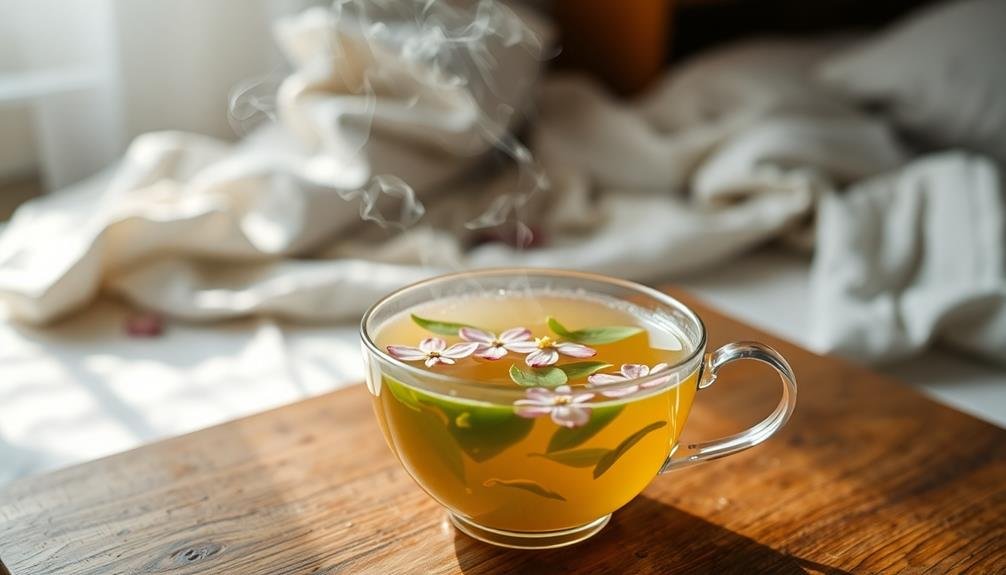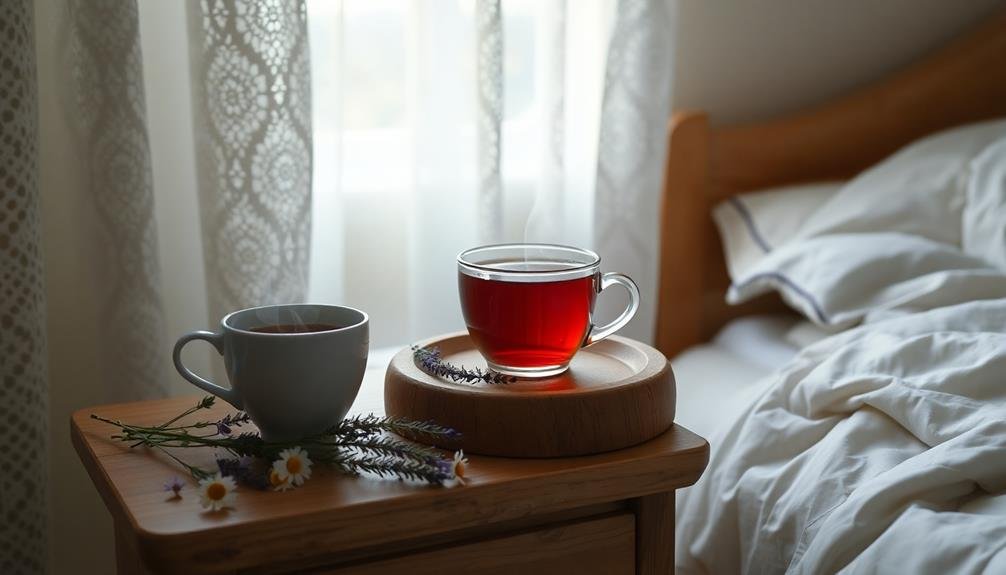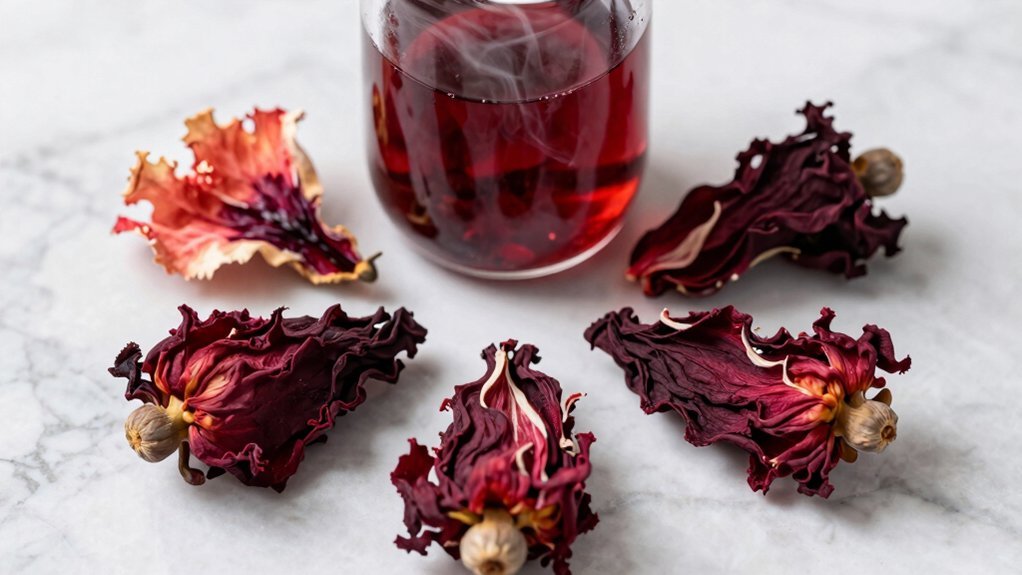Sleep-inducing herbal tea blends can be a natural remedy for restless nights. You'll find chamomile, valerian root, lavender, passionflower, and lemon balm as key ingredients in effective blends. These herbs contain compounds that promote relaxation and reduce anxiety. Try a chamomile-lavender mix for gentle calming effects, or a valerian root "sleep potion" for stronger sedative properties. A lemon balm and passionflower combination can help ease tension and improve sleep quality. Prepare your chosen blend 30-60 minutes before bedtime and sip it as part of a relaxing nighttime routine. While generally safe, it's wise to be aware of potential precautions and side effects before incorporating these teas into your regimen.
Benefits of Sleep-Inducing Herbal Teas

Many people turn to sleep-inducing herbal teas for a natural way to improve their rest. These teas offer a range of benefits that can help you achieve a more restful night's sleep. First, they're caffeine-free, ensuring you won't be stimulated before bedtime. The warm liquid itself can be soothing, helping you relax and unwind.
Herbal teas often contain compounds that promote relaxation and reduce anxiety. For example, chamomile tea has apigenin, which binds to specific receptors in your brain that may decrease anxiety and initiate sleep. Valerian root tea can increase levels of gamma-aminobutyric acid (GABA), a neurotransmitter that helps regulate sleep.
These teas can also help establish a bedtime routine, signaling to your body that it's time to wind down. Some blends may improve sleep quality, helping you stay asleep longer and wake up feeling more refreshed.
Additionally, certain herbs like lemon balm and passionflower can reduce insomnia symptoms and improve overall sleep patterns.
Essential Herbs for Better Sleep
Now that we've explored the benefits of sleep-inducing herbal teas, let's focus on specific herbs that can greatly improve your sleep quality. These natural remedies have been used for centuries to promote relaxation and combat insomnia.
When selecting herbs for your bedtime tea blend, consider incorporating these powerful sleep-enhancing options:
- Chamomile: Known for its calming properties, chamomile can reduce anxiety and promote drowsiness.
- Valerian root: This potent herb acts as a natural sedative, helping you fall asleep faster and improving sleep quality.
- Lavender: With its soothing aroma, lavender can decrease heart rate and blood pressure, preparing your body for rest.
- Passionflower: This herb increases the production of GABA, a neurotransmitter that promotes relaxation.
To create an effective sleep-inducing tea blend, you'll want to combine two or more of these herbs. Experiment with different ratios to find the perfect mixture for your needs.
Remember, consistency is key when using herbal remedies. Incorporate your chosen blend into your nightly routine, allowing at least 30 minutes for the herbs to take effect before bedtime.
You'll soon notice improved sleep quality and wake up feeling refreshed and rejuvenated.
Chamomile and Lavender Blend

Combining two powerhouse sleep-inducing herbs, chamomile and lavender create a potent blend for restless nights. This soothing mixture offers a double dose of relaxation, targeting both your mind and body to promote better sleep.
Chamomile, known for its mild sedative effects, helps calm your nerves and reduce anxiety. It contains apigenin, an antioxidant that binds to specific receptors in your brain, potentially decreasing insomnia.
Lavender, on the other hand, is renowned for its aromatherapeutic properties. Its scent can lower your heart rate and blood pressure, creating an ideal environment for sleep.
To prepare this blend, mix equal parts dried chamomile flowers and lavender buds. Steep a tablespoon of the mixture in hot water for 5-7 minutes. You'll notice a delicate floral aroma that immediately begins to relax your senses.
Sip this tea about 30 minutes before bedtime to give the herbs time to work their magic. For enhanced effects, you can add a touch of honey for sweetness or a slice of lemon for a citrusy twist.
Valerian Root Sleep Potion
If you're struggling with sleepless nights, you might want to contemplate trying a valerian root sleep potion.
This powerful herb has been used for centuries to promote relaxation and improve sleep quality.
You'll learn about the benefits of valerian root, how to brew the perfect sleep potion, and important dosage and safety considerations to keep in mind.
Benefits of Valerian Root
Valerian root consistently ranks among the most effective natural sleep aids. Its calming properties can help you fall asleep faster and improve your overall sleep quality. When you brew valerian root into a tea, you're tapping into centuries of traditional use for insomnia and anxiety relief.
The benefits of valerian root extend beyond just helping you drift off to sleep. You'll experience:
- Reduced anxiety and stress levels
- Improved sleep duration and quality
- Fewer sleep disruptions throughout the night
- Enhanced daytime focus and energy
Valerian root works by increasing the production of gamma-aminobutyric acid (GABA) in your brain. This neurotransmitter helps regulate nerve cells and calm anxiety. It's the same neurotransmitter targeted by anti-anxiety medications, but valerian root offers a natural alternative.
You'll find that regular consumption of valerian root tea can lead to long-term improvements in your sleep patterns.
It's essential to recognize that while side effects are rare, some people may experience mild headaches or dizziness. As with any herbal supplement, it's best to consult with your healthcare provider before incorporating valerian root into your nightly routine.
Brewing Perfect Sleep Potion
Crafting the perfect sleep potion with valerian root is both an art and a science. You'll need to balance the potent herb's earthy flavor with complementary ingredients for a soothing bedtime brew.
Start with 1-2 teaspoons of dried valerian root per cup of water. Steep the root in boiling water for 10-15 minutes, then strain.
To enhance the potion's efficacy and taste, add chamomile flowers, which offer a mild, apple-like flavor and additional calming properties. A touch of lemon balm can provide a citrusy note while boosting the blend's relaxing effects. For sweetness, consider adding a small amount of honey or stevia.
Experiment with proportions to find your ideal mix. A common ratio is 2 parts valerian root, 1 part chamomile, and 1 part lemon balm. Brew this mixture in a teapot or French press for easy straining.
For best results, drink your sleep potion 30-60 minutes before bedtime. Sip it slowly, allowing the warm liquid and herbal compounds to work their magic.
Dosage and Precautions
Sleep-aid dosages require careful consideration when using valerian root in your bedtime brew. Generally, you'll want to use 2-3 grams of dried valerian root per cup of hot water. Steep for 10-15 minutes before straining and drinking. It's best to consume this tea 30-60 minutes before bedtime for ideal effects.
While valerian root is generally safe for most adults, it's important to be aware of potential side effects and precautions:
- Don't combine valerian root with alcohol or other sedatives
- Avoid use if you're pregnant or breastfeeding
- Discontinue use at least two weeks before scheduled surgery
- Consult your doctor if you have liver disease or are taking medications
Start with a lower dose and gradually increase if needed. If you experience any adverse reactions, such as headaches, dizziness, or stomach upset, stop using valerian root and consult your healthcare provider.
Remember that herbal remedies can interact with medications, so it's vital to inform your doctor about any supplements you're taking. While valerian root can be an effective natural sleep aid, it's not a substitute for addressing underlying sleep issues or maintaining good sleep hygiene.
Lemon Balm and Passionflower Mix

Lemon balm and passionflower create a potent blend that soothes your nervous system, promoting relaxation and better sleep.
You'll find these herbs work synergistically to reduce anxiety and calm racing thoughts.
To prepare this mix, steep 1 teaspoon each of dried lemon balm and passionflower in hot water for 10 minutes, then strain and enjoy 1-2 cups before bedtime.
Calming Nervous System Effects
Renowned for their soothing properties, lemon balm and passionflower combine to create a potent herbal blend that calms the nervous system. This dynamic duo works synergistically to alleviate anxiety, reduce stress, and promote relaxation.
Lemon balm, with its mild sedative effects, helps ease tension and restlessness, while passionflower enhances GABA production, a neurotransmitter that promotes calmness.
When you drink this herbal tea blend, you'll experience a gentle cascade of calming effects throughout your body. The herbs interact with your nervous system to:
- Slow racing thoughts and quiet the mind
- Relax tense muscles and reduce physical stress
- Regulate heart rate and blood pressure
- Improve overall sleep quality
You'll find that this blend is particularly effective when consumed 30-60 minutes before bedtime. As you sip the tea, take deep breaths and allow the herbs to work their magic.
The combination of lemon balm and passionflower not only helps you fall asleep faster but also promotes a more restful and rejuvenating sleep throughout the night.
Preparation and Dosage
Crafting the perfect cup of this soothing herbal blend is straightforward and rewarding. To prepare your lemon balm and passionflower tea, you'll need 1 teaspoon of dried lemon balm leaves and 1 teaspoon of dried passionflower per cup of water.
Bring fresh, cold water to a boil, then remove it from heat and let it cool for about 30 seconds. Pour the water over the herbs in a tea infuser or teapot, and steep for 5-7 minutes.
For ideal results, drink this tea 30-60 minutes before bedtime. You can safely consume up to 3 cups per day, but it's best to start with one cup and adjust as needed. If you're using tea bags instead of loose herbs, use one bag of each type per cup.
Remember that herbal teas can interact with certain medications, so consult your healthcare provider if you're taking any prescription drugs.
Pregnant or nursing women should avoid passionflower tea. While this blend is generally safe for most people, it's always wise to listen to your body and discontinue use if you experience any adverse effects.
Preparing Your Bedtime Tea Ritual
Setting up your bedtime tea ritual can be a soothing way to wind down from the day. Start by choosing a quiet, comfortable spot where you can relax and enjoy your tea without distractions. Select a special mug or teacup that brings you joy and makes the experience more meaningful.
Prepare your herbal tea blend about 30-45 minutes before bedtime to allow enough time for its calming effects to take hold. While your tea steeps, engage in gentle, relaxing activities to prepare your mind and body for sleep:
- Practice deep breathing exercises
- Write in a gratitude journal
- Listen to soft, calming music
- Stretch or do gentle yoga poses
As you sip your tea, focus on its warmth and aroma. Take slow, mindful sips and savor the flavors. This is your time to let go of the day's stresses and shift into a restful state.
Make your bedtime tea ritual a consistent part of your nightly routine. Over time, your body will associate this ritual with sleep, making it easier to drift off when you climb into bed.
Precautions and Potential Side Effects

While herbal teas are generally safe, it's important to be aware of potential precautions and side effects. If you're pregnant, nursing, or taking medications, consult your healthcare provider before incorporating new herbal teas into your routine. Some herbs can interact with medications or affect certain health conditions.
Be cautious with chamomile if you have allergies to plants in the daisy family. Valerian root may cause headaches or drowsiness in some people, so avoid driving or operating machinery after consumption. Passionflower can potentially increase the effects of sedatives, so don't combine it with sleep medications.
Don't exceed recommended dosages, as some herbs can be harmful in large quantities. Lavender may cause skin irritation in some individuals, while lemon balm can potentially worsen thyroid conditions. If you experience any adverse reactions, discontinue use and seek medical advice.
Remember that herbal teas aren't regulated by the FDA, so quality and potency can vary. Choose reputable brands and organic options when possible.
While these teas can be beneficial for occasional sleeplessness, they're not a substitute for addressing underlying sleep issues or chronic insomnia.
Frequently Asked Questions
Can Children Safely Consume Sleep-Inducing Herbal Teas?
You shouldn't give children sleep-inducing herbal teas without consulting a pediatrician. Some herbs can be harmful to kids. Instead, focus on establishing a consistent bedtime routine and creating a relaxing environment for your child's sleep.
How Long Before Bedtime Should I Drink Sleep-Inducing Tea?
You should drink sleep-inducing tea about 30 to 60 minutes before bedtime. This allows your body to absorb the calming compounds and start feeling sleepy. Don't drink it too early, or you'll miss the effects.
Are Sleep-Inducing Herbal Teas Safe During Pregnancy or Breastfeeding?
You should be cautious with sleep-inducing herbal teas during pregnancy or breastfeeding. Some herbs can affect your baby. It's best to consult your healthcare provider before consuming any herbal teas while pregnant or nursing.
Can I Mix Sleep-Inducing Herbs With Prescription Sleep Medications?
You shouldn't mix sleep-inducing herbs with prescription sleep medications. It's dangerous and can lead to unexpected interactions or increased side effects. Always consult your doctor before combining any herbs or supplements with prescribed drugs.
How Often Can I Drink Sleep-Inducing Herbal Teas Without Developing Tolerance?
You can drink sleep-inducing herbal teas regularly, but it's best to vary your choices. Consume them 3-4 times a week to avoid tolerance. If you're using them daily, take occasional breaks to maintain effectiveness.
In Summary
You've now discovered some powerful herbal tea blends to help you drift off to sleep. Remember to make your bedtime tea ritual a relaxing part of your nightly routine. While these natural remedies can be effective, don't forget to consult your doctor if you're taking medications or have ongoing sleep issues. With the right blend and a consistent routine, you'll be on your way to more restful nights and energized mornings.





Leave a Reply